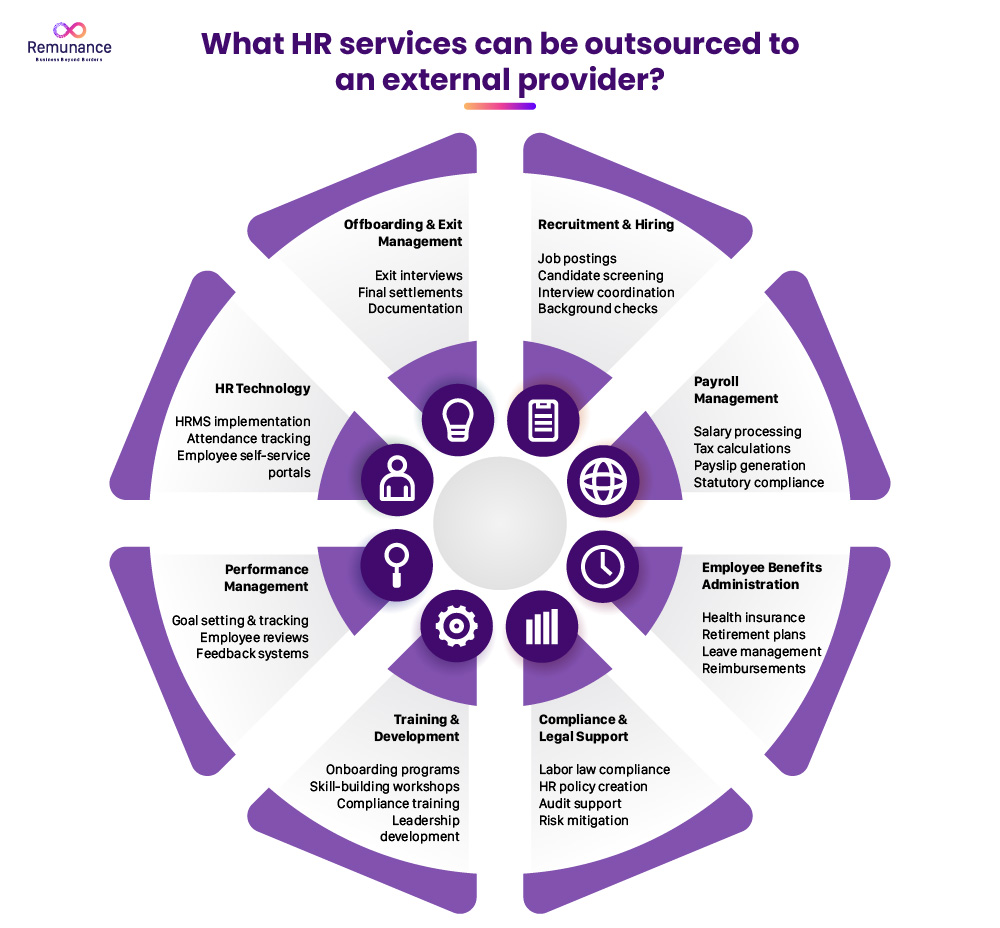Summary
There are many benefits of outsourcing HR services you can get to better manage remote teams. Companies can offload all major HR activities onto the HR partner for a better experience for the remote employees. Understand how and when you should hire outsourcing HR services.
If I were to start this blog with an opinion, it would be this: the HR industry suffered the worst when the remote work trend exploded as a global norm.
And I agree, other departments within an organisation may have had it difficult. But every single task within the HR function was affected. There were more challenges than ever in recruitment, onboarding, compliance, payroll, and even retention.
This is where the benefits of outsourcing HR services became more than just a nice-to-have option. It helped the HR teams change their way of working and adapt better to the remote work trends.
In this blog, we understand two most important things:
-
- How do outsourcing HR services benefit you as a company, and how do they help manage remote teams better?
- When should you decide on outsourcing your HR services?
What is outsourcing HR services?
Outsourcing HR services is getting into a third-party contract with an external service provider to handle some or all of your HR functions.
Nearly half of small business owners spend almost a day per week managing their HR administrative tasks.
HR outsourcing allows to take this load of HR tasks off. It further allows you to focus on business tasks that impact the profits of your business directly.
Hence, one big benefit you get out of outsourcing your HR services is letting go of a cost center department. You have someone else manage it for you with perfect efficiency. Let’s get a deeper understanding of this.
What are the benefits of outsourcing HR services?
One in every three small businesses outsource at least one HR function, says a study conducted by Clutch. Let’s understand why and what are the benefits of outsourcing HR services.
1. Cost Reduction
-
-
- Reduced labor costs – A major benefit of outsourcing HR services is that you can hire from countries where labor is inexpensive. These can be countries like India, Mexico, or Vietnam, where you get labor that is both inexpensive and highly skilled.
- Lower overheads – With HR outsourcing, you have the chance of making your teams remote. This helps exponentially lower your overheads, like office space, maintenance, etc.
- No recruitment or training expenses – HR outsourcing can help you avoid the costs of hiring and training new employees. Your HR partner can put your employees in touch with the best industry experts to get training from.
-
2. Access to expertise
-
-
- Specialised knowledge – Another one of the important advantages of Outsourcing HR functions you get specific and expert knowledge. It is like you leaving it up to Gordon Ramsay to win you that cooking contest. You get people who are industry experts to manage your HR administration.
- Industry best practices – Since they’re industry experts, they use the best practices to help you get the most value from outsourcing.
-
For example, this would include providing your employees with the top benefits in the market. This would further help attract the top layer of employees perfectly suitable for your needs.
3. Improved compliance
-
-
- Legal expertise – With great remote teams comes great compliance. You need to comply with all the necessary laws and regulations of the country you’re hiring in. Benefits of outsourcing HR services are this – it guides you, sometimes even does the compliance on your behalf. This helps you worry less about global compliance and more about your business goals.
- Risk mitigation – HR outsourcing can help reduce the risk of legal issues like lawsuits, fines, or penalties. This is achieved by ensuring compliance with labor laws. You need to handle employee concerns, maintain accurate records, and stay updated with changing regulations.
-
4. Increased efficiency
-
-
- Streamlined processes – One of the benefits of outsourcing HR functions to HR partners is that they have solid frameworks for HR tasks in place. These frameworks are foundational to their business practices, and they use them to ease the processes of managing their HR activities.
- Improved productivity – With strong frameworks in place, your HR partners are prompt and timely with HR aspects like payroll and benefits. Additionally, they also have systems set up for employee support and queries. Being attentive towards employees makes them feel important, which in turn increases their productivity at work.
-
5. Better benefits and employee engagement
-
-
- Competitive employee benefits – One of the major advantages of outsourcing HR functions is that you get access to top employee benefits in the industry. Your HR partner can provide employee benefits that employees from the Fortune 500 get.
- Improved employee engagement – Providing good employee benefits, prompt ongoing support, and ensuring employee satisfaction increases employee engagement.
- Reduced employee turnover – You see a significant decline in employee turnover when employees’ needs are taken care of, and they are happy and satisfied.
- Easier retention, more loyal employees – As a continued effect of the pointers mentioned above, it is easier to retain employees. You’re giving them all the good benefits, timely pay, and quick support; it increases their loyalty towards the company.
-
When should you outsource HR services?
And with that, we answered — why you should hire outsourcing HR services. Let’s now understand when you need these services.
1. Limited in-house HR expertise
Say, you are a business that does not have or want to allocate enough resources to HR administration.
HR outsourcing can be an easy solution when you want to invest minimal resources but still not compromise on the quality of services. They act as an extended arm to your organization.
With a dedicated HR outsourcing partner, you gain immediate access to seasoned HR professionals who bring years of industry experience to the table. They handle the full scope of HR administration services.
The better advantage you get here scaling HR support up or down as per your needs without having to incur any major costs.
2. High administrative burden
Building remote teams always brings in a pile of administrative tasks, which can easily turn into a burden. This includes tasks like international payroll processing, compliance paperwork, etc.
Managing all this internally can quickly overwhelm your team and drain valuable time and energy – especially if you have a small team managing in-office and remote teams.
Your way out – outsourcing your HR functions.
3. Growth and expansion
When you’re building remote teams, you’re carving a way to grow and expand your business. Your HR team here pulls the burden of the existing HR tasks and adapts to the growing demands. Hiring, onboarding, policy updates, compliance checks — everything becomes more complex and time-sensitive.
HR outsourcing can be a saving grace for your existing HR team. While your internal team can manage the existing HR tasks, your HR outsourcing partner can control and oversee all the additional tasks that come as you expand.
4. Need specialised services
The kind of HR services you will need depends on the stages and strategy of your business growth. This can be setting up international payroll or managing employee benefits across regions, global or local compliance, etc.
This calls for specialized HR services. Your existing HR teams might not be all equipped with the specific skills or bandwidth to handle it all. This is one of the advantages of HR functions. It helps you bridge this gap quickly and efficiently.
5. Inadequate HR tech infrastructure
Many a time, companies may not have the appropriate HR tech infrastructure required to manage a remote team. This can also include employees not skilled enough to handle and operate the new tools. Tools that are needed for the HR activities of remote employees.
In this case, instead of investing high costs in acquiring new tools and training existing teams, you can use the benefits of outsourcing HR services.
Efficient and reliable HR outsourcing with Remunance
I am not here to tell you that Remunance is your only go-to solution for HR outsourcing. I am here to tell you why working with Remunance works and yields the results you want.
Remunance Services plays the role of a strategic partner who removes all your HR headaches. How?
The team members at Remunance are seasoned experts in remote workforce management. They know how to navigate diverse labor laws, run error-free payroll, and keep remote team members engaged and supported.
With Remunance on your side, you get a flexible extension of your HR department that scales up or down with your business needs. Here’s what Remunance can do for you.
-
- Makes compliance easy: Remunance stays up-to-date with labor laws and regulations in the Indian market. That means you avoid costly fines and legal risks because dedicated experts handle all reporting and compliance tasks.
- Offers better payroll and benefits: Remunance helps you pay people accurately and on time. Our payroll infrastructure and tech ensure your distributed team never has to chase missed payments or tax forms.
- Makes remote onboarding engaging: New hires get a smooth virtual onboarding and ongoing support. Remunance helps preserve your company culture and proactively works on making all employees feel connected to the company, even if operating remotely.
- Offers on-demand scalability: Whether you need a team of 5 or 50, Remunance adjusts its services to fit. You pay for what you need, when you need it. This flexibility is important for growing SMEs that expand quickly.
Choosing Remunance means solving HR bottlenecks head-on. We’ve done it for 85+ clients from 22+ countries who have successfully hired teams in India. We can do it for you too.
Conclusion
Remember when I stated an opinion that HR bore the brunt when remote work exploded as a norm? Ignoring that reality now would be a missed opportunity. In some cases, detrimental even.
Having a really strong, fully equipped HR team is mandatory if you’re thinking of hiring remote employees. And since an internal team can consume a big chunk of your resources and money — you can rely on the benefits of outsourcing HR services to play the part for you.
FAQs
Why is HR outsourcing important?
HR outsourcing is important because it lets you focus on your core business functions. It reduces the overhead costs of internally managing HR teams. This allows companies to re-adjust these costs to business activities that actually matter in the company’s growth.
HR outsourcing can help with various functions like employee lifecycle management, benefits, and local compliance. Taking care of these activities ensures that companies are protected from any legal issues. It also makes sure employees are motivated and satisfied with the company.
What is the benefit of outsourcing HR functions for small to medium-sized companies?
Outsourcing HR functions gives SMBs (Small and Medium-sized Businesses) access to top HR experts which would otherwise be too costly to develop in-house. This expertise can range from compliance with complex labor laws to advanced strategies in recruitment. This is especially necessary for remote teams.
However, HR outsourcing is only possible when you have teams already set up in remote locations. This is difficult, particularly with SMBs as they have limited resources. This is where alternate models like EOR can be considered. EOR or Employer of Record allows SMBs to set up remote teams in locations where they don’t have a legal entity.
EOR partners, like Remunance, not only act as your legal employer, but they also manage the complete scope of HR services on your behalf. This allows small and medium-sized companies to set up teams internationally resulting in better growth opportunities.
How does outsourcing increase the effectiveness of HR?
Outsourcing increases the effectiveness of HR by giving them access to seasoned experts in the industry. The risk for potential errors is reduced by a great deal when specialists are managing your HR functions. Yes, outsourcing greatly improves the focus of businesses on core business functions. But what it also does is reduce the burden on the in-house HR team by managing tasks like payroll, employee benefits, and engagement.
If you still choose to have an in-house HR team, you can now use it for more strategic activities. Not to mention, HRO companies have expertise in local and international compliance. This further reduces legal risks and allows you to run your business with a peaceful mind.
What is HR outsourcing in India?
HR outsourcing in India basically means delegating some or all of the human resource functions to a third-party service provider in India. These providers manage a range of HR tasks on behalf of your business.
India is a rather popular location where international companies choose to set up remote teams. It has a large pool of skilled and cost-effective labor and a strong understanding of global practices. Companies looking to expand their business into the Indian market often outsource their HR functions to Indian firms. These Indian firms take care of compliance with local laws, handle a diverse workforce, and reduce operational costs.
However, without a legal entity in India, HR outsourcing cannot help you set up remote teams. You can consider HR outsourcing in India when you have a legal entity but need someone to manage the HR functions.
If you do wish to set up remote teams without having a legal entity in India, EOR would be the way to go. EOR acts as your legal employer and employs remote teams on your behalf. And to add to that, EOR partners also provide all necessary HR functions you wish to outsource.
Which is the most common HR function that is outsourced?
Payroll management is one of the most common HR functions that is outsourced. This involves calculating pay, deductions, issuing cheques, filing tax returns, etc. Most companies outsource payroll management to third-party service providers. This is to ensure risks and errors are minimized and compliance with tax laws is maximized.
What Should You Consider Before Outsourcing HR?
Before outsourcing the HR activities, the very first thing you need to consider is the cost-benefit analysis. This means conducting a comparative analysis to see which is the better and most cost-effective option between outsourcing an in-house team. This includes considering potential savings, increase in efficiency and any hidden costs outsourcing may bring.
If you do decide on outsourcing, the next factor to consider would be the scope of HR functions you wish to outsource. You’ll also have to find a service provider who is an expert in the specific services that you want to outsource.
Lastly, but more importantly, you will have to ensure data security making sure that sensitive data of your organization and employees is protected.







 Schedule a free call
Schedule a free call